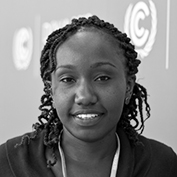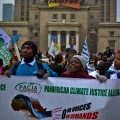African Union on COP18
Ruth Nyambura | December 3, 2012.

Perhaps one of the biggest misconceptions about Africa is that up until a few years ago, measures to tackle climate change within the continent were non-existent.
Africa didn’t have environmental protection laws, right?
Wrong.
Whilst civil society action on environmental issues could be rightly considered fledgling compared to other movements, legislation dates back to at least 1968.
The African Convention on the Conservation of Nature and the Natural Resources was established by the African Union’s predecessor. It clearly indicates that in the decade when most African countries gained independence, environmental conservation and sustainable development should also be at the top of the agenda. Conversely, the African Union’s Constitutive Act promotes utilising a multilateral approach to achieve sustainable development. It is these two documents that will inform how African countries play out the remainder of the UN climate change negotiations currently underway in Doha, Qatar.
Government delegates from Angola have already voiced their displeasure at the glacial pace of the discussions, especially those around financing and the Green Climate Fund (GCF).
The GCF is considered a success story that resulted from the climate talks in Durban, South Africa last year. Developed countries pledged to raise $100 billion per year by 2020 to assist developing countries with climate change mitigation through projects aimed at lowering greenhouse gas emissions.
There is a pervasive feeling of disappointment amongst members of the G77. A climate activist from Nigeria expressed resentment to The Verb at developed nations who are stalling the negotiations on financing for “selfish” reasons.
External economic matters, such as the global financial crisis, are amongst the primary reasons provided by developed countries as to why progress has been limited.
Nnimmo Bassey, chair of Friends of the Earth International, doesn’t believe the fund will be ready by 2020. On the UNFCCC Executive Secretary Christiana Figueres’ public concern over the accountability and transparency of the fund, Bassey believes that it is a distraction from countries shifting their emission reduction targets.
Finance is not the only concern of the African Union with the second commitment period of the Kyoto Protocol also on the back of negotiators minds. As a continent, there is little doubt that Africa will be disproportionately impacted by climate change. The strain from food production alone, such as the Sahel famine, is already being felt. Agriculture accounts for approximately seventy percent of Africa’s jobs and forty percent of the continents GDP. Without an extension to the Kyoto Protocol, climate change will exacerbate current conditions and increase the number of droughts and famines that the region records.
Climate change also has the potential to increase climate induced conflict. Jack Hamilton says that a “Scarcity of resources, be they farmable land, water or livestock, is creating mass migrations and antagonising pre-existing tensions in a vicious circle.” Within the last three months, Kenya has seen an increase in resource fuelled conflicts that ultimately cost at least two hundred lives.
Africa will clearly feel the impacts of climate change, and now it is the African Union’s time to be at the forefront in maintaining a strong stance on the issues of technology transfer and financing.
By Ruth Nyambura and Linh Do, photo by Laura Owsianka.












comment